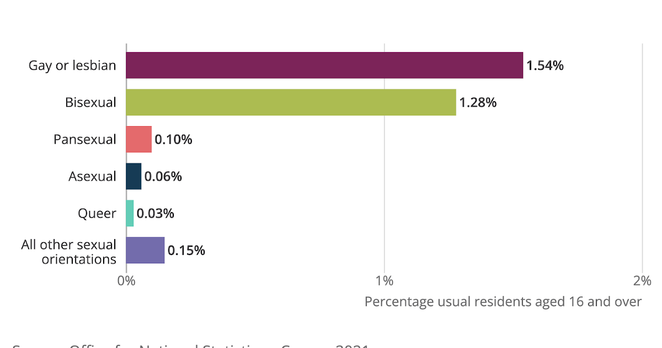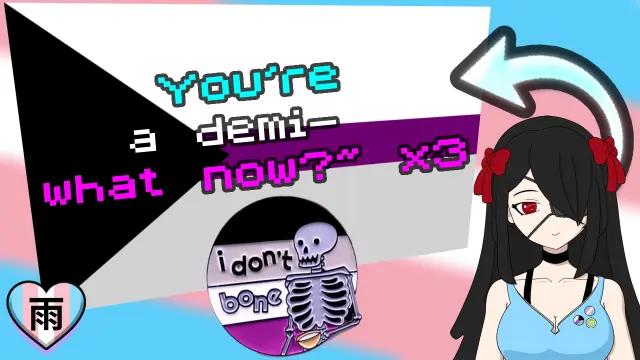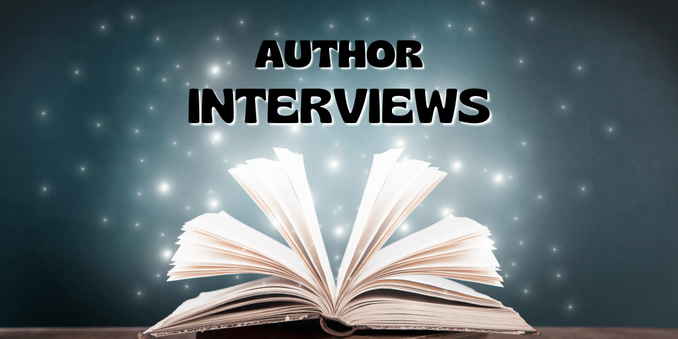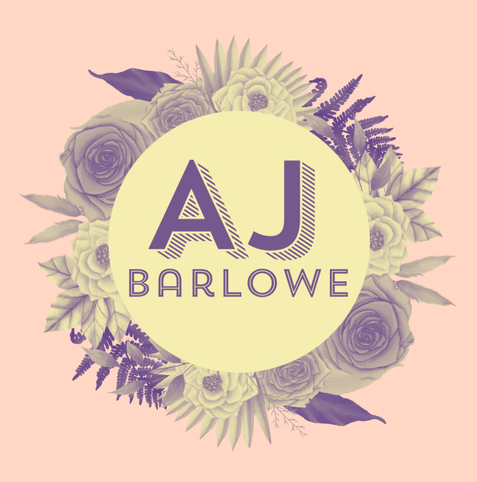Here's my latest blog-post, which I have been working on for several months, on my personal experience of #SexualFantasies and how they relate to my #asexuality & #demisexuality.
How did you found out that you're demisexual?
How did you found out that you're demisexual? - Blåhaj Lemmy
I’ve to be honest haven’t heard about demisexuality before, I had a friend who was demisexual and I talked to him about the way I felt and my experiences, he pointed me into this direction and I did further research on this topic and that’s ultimately how I got here ^^ What about you?


https://www.youtube.com/watch?v=OmPl75IIZF0
#demisexual #demisexuality #demi #ace #asexual #asexuality #youtube #vtuber
Author Spotlight: A.J. Barlowe
A. J. Barlowe (they/them) is an author, reader, and cat parent.
They write queer stories that deal with difficult subjects, but always with the overarching theme of hope, healing, and the power of human connection.
Author Links:
Book link: books2read.com/ASOR
Insta/tiktok: @aj_barlowe
What provided the seeds of your slowburn m/m novel, A Series of Rooms, and can you describe your writing process from that first idea to your first draft to your revised version to published final product? What did that process look like for you?
The seeds of this story have lived in my head & my heart for about a decade. The initial spark came about from a throwaway line in a television show, about an undercover cop who spend one night with a trafficking victim in order to maintain his cover, and they just spent the whole night talking. Something about the idea of that momentary reprieve, a single night of safety in an otherwise hellish existence, really stuck with me.
The characters and the story have taken different shapes over the years I spent mapping it out, but the basic premise was always the same: a survivor trapped in a terrible situation, a lonely patron desperate for companionship, and a gentle, patient love that blooms solely out of an emotional connection. Two strangers at a crossroads of isolation and yearning for more from life.
The first draft shares a similar framework to the final product, but there were certainly a lot of changes along the way (including a 50% word count reduction—oops). I think the biggest change revolved around the circumstances of Jonah’s captivity. The thing I obsessed over the most in editing/rewriting was trying to ensure that his story was not sensationalized or gratuitous.
That was always the most important factor to get right. I wrote most of the first draft in 2020 during quarantine, and the following four years saw me in various stages of pulling my hair out to make sure I was putting out a story I could stand behind.
A Series of Rooms deals with heavy topics of sex trafficking, SA, and healing from trauma through healthy relationships. What did you draw upon for these themes, and how did you go about tackling them sensitively in your novel?
I’ve always used writing as a way of dealing with my own experiences. The exact circumstances of my story are not a direct reflection of my own—this certainly isn’t autobiographical.
But there are very personal pieces of my own story inextricably woven into these characters, and certain scenes that felt like they were plucked directly from my heart.
I answered this a little bit in the previous question, but to elaborate on what the several-year journey looked like in terms of due diligence: I did lots and lots of research. Some of that research revolved around legal system logistics (and about how broken that system is). But a lot of it was reading firsthand accounts of male survivors.
What kinds of queer rep can be found in A Series of Rooms, and can you elaborate a little on the demisexual rep for those unfamiliar with the spectrum of asexuality?
Gay and demisexual representation! For those who are unfamiliar, demisexual is a label that falls somewhere on the asexual spectrum.
On a very simplistic level, it means that someone’s sexual attraction isn’t rooted in physical appearance or first impressions, that they only really get to that level with someone after an emotional connection has been formed.
Although I don’t use the label outright in the story (as I am not very good with assigning myself labels in real life), it is very clear that Liam identifies with this term. I think this is one of many factors that make him a safe person in Jonah’s eyes, when they are first walking that teetering line of trust. Jonah is used to being viewed as a sexual object, and Liam keeps subverting those expectations at every term. He truly only wants to get to know him as a person before their relationship resembles anything physical.
What are your favourite tropes in queer romance to read, and what are your favourite tropes to write?
I’m a sucker for hurt/comfort, always. Both reading and writing. In one of my promotional graphics or A Series of Rooms, I listed a trope of “the horrors of being treated gently for the first time,” and I feel like that really sums up my taste in a nutshell.
How have readers responded to your work and can you share a few of your favourite comments/reviews that you’ve received?
I have been absolutely blown away by the reader response to this story. It’s my very first novel, and I published independently, so I knew there was a very real chance that this book wouldn’t make it outside of a very niche circle of friends.
I’m very lucky to be able to say it has blown my expectations out of the water. I had a thousand sales in my first month, which was genuinely more than I expected to get in a lifetime.
The people in the social media book spaces have been especially kind to me. It’s tough to pick only a few of the lovely comments, but here are some that really stuck with me:
“This is a story about two young men desperate to mean something to someone. Though strangers at first, Liam immediately sees Jonah’s pain and doesn’t look away.” – @reading_oceanside (IG)
“Intensely emotional–jarring–but vividly and uniquely gorgeous.” – @cara.reads.all.the.books (IG)
“The darkness of what Jonah goes through is expertly balanced by the softness Liam shows him. There were times I cried and raged, but I was ultimately left with hope for humanity and the kindness we are capable of showing each other.” – @elliot.roi.reads (IG)
What can people look out for from you – anything coming soon?
I am currently working simultaneously on a couple of stories, but trying to keep a lid on the details… at least for a little bit longer. Hoping to meet my word count threshold for an announcement by the end of March!
#asexualSpectrum #AuthorInterview #AuthorSpotlight #demisexualRomance #demisexuality #gayRomance #mMRomance #queerRomance #romance
I've read this post, and I find myself able to articulate why I'm not demisexual:
https://zeroes.ca/@hannu_ikonen/114723162597239144
I *can* have sexual attraction before any emotional connection.
However, I do want emotional connection before we have sex. This connection can form quickly.
Han(nu) Solo, MD (@hannu_ikonen@zeroes.ca)
🏛️ Demisexuality: What is it and why is it Asexual Spectrum? [Reposted & Updated from Old med-mastodon.com Account] 🔸 So the Cleveland Clinic definition is imperfect but pretty solid for starters: "Demisexuality is a sexual orientation in which a person feels sexually attracted to someone only after they’ve developed a close emotional bond with them. Forming a bond doesn’t guarantee a person will feel a sexual attraction, but the bond is needed before sexual attraction is [unlocked]. Demisexuality is a sexual orientation. People who identify as demisexual only feel sexual attraction to someone after they’ve formed a strong emotional bond with them. Compared to the general population... The length of time needed to create an emotional bond varies. Some people who are demisexual develop a close bond quickly, but others only develop a bond after several years of friendship with someone." 🔸 The LGBTQIA Wiki Defines Demisexuality as: "Demisexual is a sexual orientation most often defined as only experiencing sexual attraction when an emotional connection or bond has formed with someone.[1][2][3][4][5]... Another definition is a person who does not experience primary sexual attraction (defined as sexual attraction that is based on sight, smell, or other information instantly available upon meeting someone) but does experience secondary sexual attraction (attraction that develops over time based upon the relationship and connection with another person). How much demisexuals need to know about another person and for how long they need to know about them before they may develop secondary sexual attraction varies from person to person.[7] Demisexual people can be gay, straight, bisexual, or any other orientation describing the gender(s) of people they are attracted to.[8] Some add demi- as a prefix to another sexual orientation label, such as "demi-bisexual".[3] Demisexuality is part of the asexual spectrum." 🔸 As above, it is widely accepted to be part of the asexual spectrum and typically implies a low partner number count rather than necessarily a low sexual activity drive. Plainly put, it takes demisexuals longer to warm up to someone. But they can get warm with variable frequency & intensity thereafter as far as sexual activity goes. They can fall in love. They can be romantic. They can be close friends instead. It's variable. 🔸 Stonewall Scotland Elaborates on the Asexual Spectrum and why Demisexual is typically included & other things you should know about being "ace": 1. You don’t have to experience zero sexual attraction to be a part of the ace community. Demisexual and greysexual people belong in the community. 2. People on the ace spectrum don’t want your pity. Just because they may feel sexual attraction in different ways, doesn’t mean they don’t feel excitement! 3. People’s sexualities sitting within the ace spectrum [don't] necessarily have anything to do with past sexual trauma – but, even if there were links, their identity is no less valid. 4. Some people on the ace spectrum do have a sex drive (instrumentally speaking, such as masturbatory drive). 5. People can be both bisexual and demisexual. LGBTQIA+ people know themselves deeply. When you consistently come out to yourself and those around you, it’s hard NOT to know who you are. 6. It’s OK to be confused about your identity – but, ultimately, knowing yourself is awesome! 🔸 For my disclosures (because I dont give a fuck what anyone knows about me, that's just me) it typically takes me around 2 years and a special connection to unlock sexual attraction. I've had 3 sex partners in my life, a low count by any measure, and had this kind of connections with 6 (edit: doublecounted) individuals. ~50% mark is because some were friends, happily married, or met when I was freshly married (I don't cheat). ▫️ I've often thought about giving up on explaining that I'm ace but demi, but really, its liberational to know yourself & identify yourself so I roll with it even if it sparks mass confusion -- for others, and for myself sometimes. It's not helpful that I am often unaware of the sexual attraction until it reaches a certain threshold of bonding. What tends to be a natural evolution of feelings for me, can seem like it comes out of nowhere to others, and even myself though I am obviously more accepting that this is just how I am wired. #Ace #Asexual #AceSpectrum #Demisexual
Every time I reread this scene where Carolyn talks to her ex-boyfriend about her sexuality, it makes me cry. I hope it has as much impact for people reading as it had for me when I wrote it.
#queerfiction #queerauthors #asexuality #demisexuality #editing #writing
actually, I'd be very interested if anybody had recs for a Demisexuality 101/201-level introduction (preferably in video or podcast format) that you personally enjoyed? Particularly things aimed at people who might be on the ace spectrum somewhere but don't know much about it?
This is a request for resources you or people you know personally found interesting/helpful in this area, not a "please google this for me" request, thank you 🖤
Certain social encounters always knock me askew to some degree, a long-standing issue. It's not so much what-might-have-been, but what's always been precluded for me, sex drive notwithstanding. It affects me still, and too, I'm philosophical about it. The two are not mutually exclusive. (Thank God for (healthy) sublimation...)
I've been reading about #demisexuality & am struggling with understanding it in the context of being an #ActuallyAutistic person who scripts a lot of social interactions & therefore has a lot of mental models of other people in their head. Even if the models aren't very accurate initially, I kind of need them in order to script an interaction in advance with someone who I've met before. So while a lot of my relationships may be shallow in reality, they feel deeper to me.
1/2



